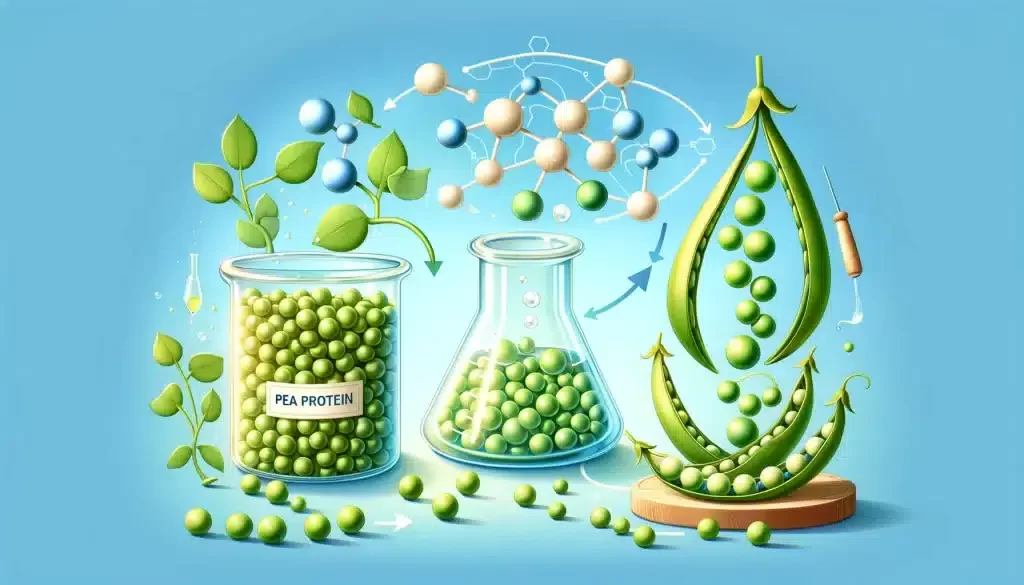Research on the Bitterness and Debittering of Pea Peptides
Explore innovative debittering methods for pea peptides with secondary butanol and β-CD, enhancing food applications through reduced bitterness and improved taste.
Keywords:
Pretreatment; enzymatic hydrolysis; pea peptides; bitterness; antioxidant activity
Abstract:
This study explores the inherent bitterness in pea peptides (PPH) and evaluates various debittering methods. Through comparative analysis of protein content and bitterness scores among commercial pea peptides, the impact of secondary butanol, flavor protease, and β-cyclodextrin (β-CD) on reducing pea peptide bitterness was investigated. The combination of secondary butanol and β-CD showed a significant reduction in bitterness, further supported by electronic tongue analysis and changes in peptide characteristics post-debittering treatments.
Introduction:
Pea peptides, derived from the hydrolysis of pea proteins, have been recognized for their nutritional and functional properties. However, the bitterness of pea peptides limits their application in food products. Understanding the mechanisms behind the bitterness and exploring efficient debittering techniques are crucial for enhancing the palatability of pea peptide-based products.
Bitterness of Pea Peptides:
Comparison of protein content and bitterness scores between commercial pea peptides and PPH prepared through thermal and enzymatic hydrolysis indicated a significant bitterness issue across all samples. The bitterness is primarily associated with the exposure of hydrophobic domains during hydrolysis and the presence of bulky hydrophobic amino acids at the C and N termini of the peptides.
Debittering Techniques:
Secondary Butanol Treatment:
The application of secondary butanol to PPH samples resulted in a decrease in bitterness scores. The hydrophobic interaction between secondary butanol and hydrophobic/ aromatic amino acids in PPH might facilitate the transfer of hydrophobic peptides to the alcohol phase, reducing bitterness.
Flavor Protease Treatment:
Further hydrolysis by flavor protease yielded a lower bitterness score, attributed to the enzyme’s exopeptidase activity removing terminal amino acids from bitter peptides. However, the reduction in bitterness plateaued with increased enzyme concentration, suggesting limited access and activity sites for the enzyme.
β-Cyclodextrin (β-CD) Application:
The addition of β-CD significantly reduced bitterness scores in a concentration-dependent manner. The formation of inclusion complexes between β-CD and aromatic amino acids, coupled with β-CD’s natural sweetness, contributed to bitterness masking.
Combined Debittering Approach:
A combination of secondary butanol and β-CD was more effective than individual treatments, achieving negligible bitterness scores. This suggests that secondary butanol may alter peptide structures to expose more hydrophobic domains, which then interact more effectively with β-CD.
Electronic Tongue Analysis and Peptide Characteristics:
Electronic tongue analysis corroborated sensory panel results, indicating a significant reduction in bitterness for samples treated with the combined debittering approach. Analysis of pea peptide characteristics post-debittering treatments revealed changes in surface hydrophobicity, solubility, color, and the composition of free amino acids, reflecting the efficacy of the debittering processes.
Conclusion:
This study highlights the significance of understanding the underlying causes of pea peptide bitterness and demonstrates the effectiveness of combined debittering treatments. The combination of secondary butanol and β-CD emerges as a promising approach for reducing the bitterness of pea peptides, enhancing their potential for use in food applications.
For more further detailed information of this research, feel free to contact our team for asssistance.
Original research by Xia Yixuan, Zhang Hui, Hui Ju, Mu Wanmeng (Food Engineering, Jiangnan University, Wuxi 214122)
About ETprotein:
ETprotein, a reputable rice protein Chinese factory manufacturer and supplier, is renowned for producing, stocking, exporting, and delivering the highest quality organic bulk vegan protein and plant proteins. They include Organic rice protein, clear rice protein, pea protein, clear pea protein, pumpkin seed protein, sunflower seed protein, mung bean protein, etc. Our offerings, characterized by a neutral taste, non-GMO, allergen-free attributes, cater to a diverse range of industries. We serve nutraceutical, pharmaceutical, cosmeceutical, veterinary, as well as food and beverage finished product distributors, traders, and manufacturers across Europe, USA, Canada, Australia, Thailand, Japan, Korea, Brazil, and Chile, among others.
Our specialization includes exporting and delivering tailor-made protein powder and finished nutritional supplements. Our extensive product range covers sectors like Food and Beverage, Sports Nutrition, Weight Management, Dietary Supplements, Health and Wellness Products, and Infant Formula, ensuring comprehensive solutions to meet all your protein needs.
As a trusted company by leading global food and beverage brands and Fortune 500 companies, ETprotein reinforces China’s reputation in the global arena. For more information or to sample our products, please contact us and email sales(at)ETprotein.com today.












